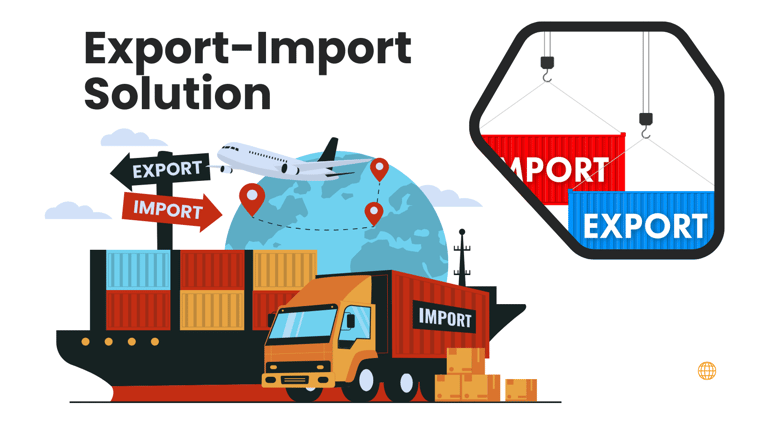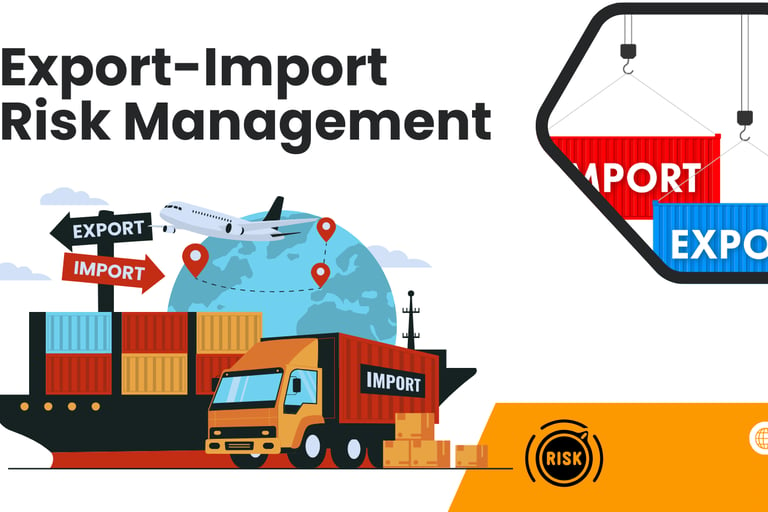Get Free E-Book(ERP Systems) - Click here
The Complete Guide to Global Import/Export Solutions: Grow Your International Business
5/8/20253 min read


In this connected world, it is longer optional to grow outside local markets anymore – it was necessary. Businesses are now trying to find sustainable global solutions for import /export to tap in to the international audience and get good quality products with best value.
Whether you are an owner of a small business or a business owner of large enterprise, then you may realize unlimited growth opportunities if you know about global import export practices.
This Blog details what the global import/export solutions are, the benefits of the solution, and how a business can succeed in the global market.
Introduction: Why Global Import/Export Solutions Matter Today
1. What Are Global Import/Export Solutions?
Import/export solutions globally mean services, strategies, tools, and systems that facilitate establishment trading activities between countries effectively and legally.
These solutions include:
Logistics and shipping services
Customs clearance and compliance
Sourcing and procurement strategies
Trade finance and payment systems
Legal documentation and regulations
Market research and partner search
2. Why Global Import Export Solutions are Necessary for Businesses.
Key Benefits:
Market Expansion, sell to customers outside your borders.
Cost Savings – Procure raw materials or products at a reduced cost.
Diversification – Minimize risk by expanding the business to multiple markets.
Competitive Edge – Provide international products or conquer the world. Whether
you are exporting Indian textiles to the US or importing electronics from China, a right global import/export partner will help eliminate challenges that may arise.
3. Who Can Do Import/Export ?
Manufacturers wanting to sell abroad
Retailers bringing in exotic products
E-commerce sellers tapping world-market
Distributors dealing with foreign goods
Startups vetting the world market
Nowadays, trade is not limited only for big companies but can be practiced by each one. Just with the right support, small businesses can also become international players.
4. Steps to Start Your Import/Export Business
For the ones that are new to the global import/export world, here’s a short guide map:
Getting Started:
The product you are to identify – should be goods that have high demand and are easy to comply with.
Research markets for targeted customers/suppliers – Find countries likely to have them.
Create your business – get licenses, GST, IEC (Import Export Code) in India.
Search for Advertisement partners platforms such as Alibaba, IndiaMART and GlobalSource.
Select your model of shipping – air, sea, or courier according to volume and budget.
Learn about taxes as well as regulations Learn duties, limitations, and necessary documents.
Join forces with global import/export experts – and they will handle customs, logistics, paperwork.
5. The Top 3 Criteria I Use to Identify a Successful Global Import/Export Solution Provider.
A good partner can make or break you when it comes to international trade experience.
Look for: Experience with your industry
Global logistics network
Strong customer support
Compliance and documentation expertise
Affordable, transparent pricing For instance, in off the
Bizbrave Ventures you can find global import/export solutions that are specific to any business size and industry.
6. Services that are provided by Global Import/Export Solution Providers.
Logistics Management
Freight forwarding
Warehousing and packaging
Real-time tracking
Customs and Compliance
HS code classification
Duty and tax calculation
Preparation of the document (inv, packing, CoO)
Trade Finance Support Letter of Credit (LC)
Payment gateway integration
Currency conversion advice
Market Research and Advisory
Competitor analysis
Pricing strategy
Local laws and import restrictions
7. Popular Challenges in Global Trade (and Solutions)
Problems You May Face: Complex customs rules
Delayed shipments Currency fluctuations Fraudulent suppliers
How to Solve Them: Work with verified global partners
Automate tracking and updaes
Use safe international payments (PayPal, Escrow etc.).
Keep valuable knowledge running throughout all times.
8. Import and Export Documentation Checklist
Global trade boils down to a proper paperwork.
Here are key documents:
For Importers:
Purchase Order
Bill of Lading/Airway
Bill Invoice & Packing List
Import License (if required)
Insurance Certificate
For Exporters:
Commercial Invoice
Export License
Certificate of Origin (CoO)
Shipping Bill
Export Declaration Form
Errors on the documentation can cause delay, penalty, or seizure of shipment. Always double-check.
9. Choosing the Right Markets to Import/Export
Where to Export From India? USA (textiles, software, spices) UAE (machinery, gems, organic products) Germany (pharma, chemicals) Where to Import From: China (electronics, machinery) South Korea (automobile parts) Japan (technology products) How to Choose: Use Google Trends. Attend international trade fairs Study competitor markets
10. Tools and Software for Import/Export Business
Helpful Tools: ERP systems – in order to control stock and orders CRM – to automate customer relationship management; Shipping calculators – to calculate the price for freight and import duty. Digital signatures for the submission of online documents These tools ease manual work and facilitate operations’ scaling.
Final Thoughts: Introduction into Global Trade.
Global import/export solutions will open doors into international markets, improved suppliers and global presence.
With the right partners and planning a small business is also able to go global.
Don’t be fooled by complexity begin with expert assistance, use proper steps, and go global.


Get in touch
Contacts
info@bizbrave.com
